Startup Development Services
Custom software development services for startups
Startup Software Development Services

Is Your Startup’s Tech Ready to Scale?
Most startups begin with quick, low-cost tech stacks to get to market fast. But as user numbers rise and product / service demands grow, those early systems start breaking, slowing performance, blocking feature rollouts, and exposing security gaps. We help startups replace fragile, patchwork solutions with scalable, custom software designed to support rapid growth, product pivots, and investor expectations.
We use reliable technologies like React, Node.js, and AWS to build systems that are fast, secure, and scalable. Our goal is to create solutions that help your startup move quickly and grow without losing quality. With Codewave, your tech is ready to handle growth, avoid common scaling issues, and help your startup succeed in today’s competitive market.
Here’s how we help solve the key challenges startups face:
- Cloud Solutions: We build cloud-based platforms that save you money on infrastructure and scale smoothly as your business grows.
- Microservices Architecture: We break your platform into smaller, independent services that can scale individually, ensuring better performance and flexibility during busy times.
- Serverless Architecture: With serverless technology, we automatically adjust your system to handle user demand, which reduces costs and complexity.

Here’s how our development process translates into outcomes for your startup:
6-12 Weeks
Time to MVP Launch
85%
User Onboarding Success Rate
99.9%
Platform Uptime
Up to 40%
Cost Efficiency Improvement
Download The Master Guide For Building Delightful, Sticky Apps In 2025.
Build your app like a PRO. Nail everything from that first lightbulb moment to the first million.
Zero Guesswork. Zero Scrapping. 100% Scaling Up.
You have an idea. We build it right, fast, clear, and with zero rework. Our team moves quickly, ships solid code, and helps you launch with confidence. From MVP to market-fit, we bring 100% clarity to every sprint.
If your MVP isn’t built to scale, your startup is at risk. Poor scalability can lead to slowdowns, crashes, and frustrated users as your business grows. We focus on building MVPs that are quick to market, designed for growth from the start, ensuring your tech can handle increased demand and set you up for long-term success.
We use Node.js, which ensures fast performance for high traffic, React, provides a dynamic user interface, and PostgreSQL offers reliable, scalable data storage.
To keep your MVP lightweight yet ready for growth, we integrate AWS Lambda for serverless scalability and Docker containers for consistent, efficient deployments. This ensures that as demand increases, your product can scale without costly infrastructure changes.
From day one, we focus on performance optimization and thorough testing to ensure your MVP runs smoothly, even as your user base grows.
For example, say you’re launching a fitness app and gain 10K users in a week. A poorly built MVP would crash under that load. With scalable architecture and a reactive dev pipeline, we ensure your app handles the demand and keeps users hooked—no growing pains.
Poor user experience kills growth. If your users can’t find what they need, complete actions, or understand navigation flows, engagement drops, conversions stall, and retention suffers. Most platforms struggle with clunky layouts, unclear CTAs, or inconsistent experiences across devices.
Our UI/UX design process is built to prevent that. We don’t just guess, we observe. Using tools like Hotjar and FullStory, we track where users click, pause, scroll, and drop off. These behavioral insights help us identify friction points and redesign interactions that feel natural and intuitive. With Figma, we quickly prototype and iterate interfaces; testing usability in real-time. Every design is vetted for:
- Clarity – So users always know what to do next
- Responsiveness – Seamless experience across screen sizes
- Accessibility – Built-in compliance with WCAG standards
- Conversion flow – Fewer clicks, faster outcomes
For example, in an edtech product where many learners drop off during video assessments, behaviour data might reveal friction points like unclear progress indicators or confusing navigation. By simplifying the flow, adding clear tooltips, and improving screen layouts, we redesigned the experience to help users complete assessments confidently, reducing drop-offs and increasing task completion rates.
Scaling gets complicated when your product isn’t built for the cloud from day one. You risk slowdowns during traffic spikes, spend more on infrastructure than you need to, and face downtime when reliability matters most. That’s why we start with a cloud-native foundation — built for speed, flexibility, and seamless growth.
Instead of one large, rigid system, we design your platform as a collection of smaller, independent services. This makes it easier to scale specific parts of your product without affecting the rest. We utilize proven tools such as AWS, Kubernetes, and serverless functions to maintain a lightweight, responsive, and cost-efficient system. New environments can be launched in minutes, and tasks that don’t need constant attention are handled automatically.
For example, in a fintech app, the loan approval process can be set up as a separate service. If demand spikes, only that service scales up, keeping your costs under control and the rest of your platform running smoothly.
That’s the advantage of cloud-native architecture: built for speed, built for scale, and built to keep you in control.
Slow, manual deployments and delayed releases hold startups back. If you can’t ship updates quickly or catch bugs early, it risks product stability and slows growth. What you need is speed with control — fast, safe releases that don’t disrupt your service.
That’s what our DevOps and CI/CD setup delivers. When a developer pushes new code, automated pipelines immediately run tests to catch issues before they cause problems. Once everything’s cleared, the code is automatically deployed using Argo CD, allowing smooth, zero-downtime releases.
We also use Terraform to create reusable infrastructure templates. This means setting up new environments for testing, staging, or feature trials takes just minutes, fully versioned and traceable.
For example, if a mobility startup wants to adjust its dynamic pricing every day, our pipeline ensures each update is tested, approved, and released automatically, without affecting ongoing ride bookings or service reliability.
When products aren’t built with APIs at their core, scalability and flexibility suffer. Teams end up duplicating logic, dealing with data mismatches, and facing delays when adding new platforms or third-party integrations. An API-first approach prevents this by making backend services the foundation, designed, tested, and documented before any UI development begins.
We start by identifying your key business functions that should work across platforms. These are developed as RESTful APIs or GraphQL endpoints, tested independently to ensure speed, reliability, and reusability. Tools like Postman and Swagger help us document every API clearly, so both your internal teams and external partners can easily use them.
The result is a modular, decoupled system where services communicate cleanly, allowing faster updates, consistent data delivery, and reduced long-term tech debt.
For example, a logistics platform might build an API for real-time shipment tracking. This same API then powers both their web dashboard and mobile app, ensuring seamless data flow, lower development effort, and easier scaling as new features or channels are added.
We help startups design, build, and launch e-commerce platforms tailored to their business model. Whether it’s a direct-to-consumer (D2C) store, multi-vendor marketplace, or niche product site, we cover everything you need to get online fast and grow steadily.
Our services include product catalogue management, order tracking, secure payments, and other essential features for a reliable e-commerce business.
To deliver speed and flexibility, we use headless commerce architectures with frameworks like Next.js or Remix, paired with platforms such as Shopify Hydrogen, Medusa, or Strapi. This makes it easy to manage products and content while keeping your store fast, mobile-optimised, and scalable as new features or sales channels are added.
We also integrate must-haves like payment gateways (Razorpay, Stripe, Cashfree), inventory tools, and marketing automation — so you can manage everything from a single, scalable system.
For example, a fashion startup can launch quickly with a Shopify Hydrogen backend, Next.js storefront, and features like dynamic pricing and order tracking. As demand grows, they can easily add influencer storefronts or mobile apps without overhauling the platform.
For startups, launching your MVP isn’t the finish line — it’s the starting point. Without a solid post-launch plan, your product can quickly feel outdated, users may lose interest, and technical issues can pile up, slowing down growth. We help startups keep their products fresh, stable, and scalable after launch.
Our team provides continuous product improvements, performance optimisation, and new feature development based on how real users interact with your app or platform. Using tools like Mixpanel and FullStory, we track user behaviour and identify what needs fixing, upgrading, or adding next.
With our CI/CD pipelines, updates are released quickly and safely, using feature toggles for controlled rollouts so you can test new features with a small audience before going live. As your product grows, we fine-tune the infrastructure — whether that means containerisation with Docker or moving to serverless setups — to match your traffic and performance needs.
Example: A fitness startup might launch with basic workout plans, then gradually add features like wearable integrations or live coaching sessions. We help manage those updates smoothly, keeping the app fast, engaging, and scalable, while avoiding costly technical debt.
Break the Cycle of Broken Releases.
Tired of buggy rollouts? We deliver stable releases with zero post-launch fixes. 94% of our startup projects hit production without any issues. You grow, we code.
Founders often get stuck choosing tech stacks that overcomplicate MVPs or won’t scale later. We help you pick the right frameworks, databases, and cloud tools based on your product stage, user volume, and budget.
Example: A pre-seed legaltech startup picked Firebase + React to simplify backend setup, cut dev costs, and launch in 4 weeks — avoiding AWS overkill until scaling is needed.
Startups don’t need enterprise BI dashboards. What you need is clear, real-time insight into user engagement, retention signals, and drop-off points.
We embed lightweight analytics tools like Mixpanel, PostHog, or Amplitude to track what features people actually use — and help you pivot or double down.
Example: A creator platform can notice a spike in audio feature retention and use that data to secure their next funding round.
Testing new pricing, onboarding flows, or feature tweaks shouldn’t need a full release. We set up simple, SDK-based A/B testing tools like PostHog or Optimizely Lite so you can experiment in real-time without downtime.
Example: A SaaS startup can test 2 onboarding flows and improve signup rates by 25% in a week — no redeploy required.
Every update feels risky when you’re early-stage. We set up zero-downtime rollback systems using simple blue-green or canary strategies on cloud platforms like Vercel, Netlify, or Railway — no Kubernetes complexity needed.
Example: A wellness app can push a bad update on Friday night. Our rollback system restored the last stable version instantly, avoiding downtime or churn.
Your startup needs a partner who gets it.
Smart Startup Development: Lean, Efficient, Effective.
We follow a process as clear and focused as your vision, turning ideas into simple, effective solutions without the extra steps.
We start with a discovery workshop to understand the core problem your product solves, focusing on user pain points, needs, and behaviors, not just features. Our goal is to uncover the real problems and motivations driving your product’s success.
We map user personas, define pain points and goals, and identify user journeys to prioritize key features. We validate assumptions through quick tests like interviews or surveys and set product goals aligned with your vision. This ensures every feature directly supports your mission.
Using structured frameworks, we focus on core user needs, avoid unnecessary features, and lay a solid foundation for future development, saving time and resources.
Once the problem is clear, we select a lean, scalable stack tailored to your product’s scope and growth stage. We assess team skillsets and future hiring ease, then plan modular, API-first architecture. This ensures tech decisions support long-term agility without overengineering in early phases.
We map core user flows to identify friction points and define the ideal interaction paths. Wireframes follow, focusing on clarity and intent. Only after validating these flows with real users do we move to a detailed UI. This process ensures the interface is intuitive and purpose-built before visual design begins.
We break down features using agile sprints, aligning each with business value and delivery timelines. Prioritization frameworks like MoSCoW or RICE guide what’s built first. Weekly checkpoints keep stakeholders informed, while scope control ensures development stays lean, fast, and focused on high-impact outcomes.
Development runs in parallel tracks with clean code separation. Each unit is containerized, tested, and version-controlled. We automate builds and deployments to reduce errors and accelerate releases. This setup enables faster iterations, stable environments, and better long-term maintainability as your product scales.
After launch, we analyze product usage and system performance to surface key improvement areas. Behavioral patterns inform feature updates, while infrastructure metrics highlight bottlenecks. Based on this, we fine-tune experiences and optimize resource usage, keeping your product fast, reliable, and aligned with real-world demand.
Tech That Grows with Your Startup.
| Project Management & Collaboration |
|
| Version Control & Code Management |
|
| Frontend Development |
|
| Backend Development |
|
| Cloud Infrastructure |
|
| CI/CD & Automation |
|
| Database Management |
|
| UX/UI Design & Prototyping |
|
| Testing & Debugging |
|
| Analytics & Monitoring |
|
| Security & Authentication |
|
| Mobile Development |
|
| SaaS Integrations |
|
| Payment Systems |
|
We Speak Startup - In Every Sector.
Having worked with 400+ businesses across 15+ industries, we know what startups need. We bring fresh ideas and practical solutions to every challenge.
| Healthcare | We develop telehealth platforms with secure appointment bookings, prescription payments, and real-time patient dashboards. Example: A healthcare startup offers video consultations and paid lab booking services through a unified ecommerce-enabled portal. |
| Transportation | We create logistics apps that offer real-time fleet tracking, automated route optimization, and live dispatch updates. Dashboards provide visibility into vehicle location, fuel usage, and delivery performance. Example: A logistics startup will use a custom platform to monitor live vehicle movement and dynamically reroute drivers based on traffic or delivery changes. |
| Retail | We build headless ecommerce platforms with real-time inventory sync, mobile-first storefronts, and seamless integrations with CRMs, payment gateways, and logistics. Example: A fashion brand launches with a Shopify Hydrogen backend, dynamic product pages, and real-time order tracking, scaling to influencer storefronts and mobile apps as demand grows. |
| Insurance | We design insurance apps that simplify policy management, claims tracking, and document uploads. Users get real-time updates on claim status and coverage details through an intuitive dashboard. Example: An auto insurance provider will offer a digital portal where customers submit claims, upload damage photos, and track processing in real time. |
| Education | Our education platforms integrate learning tools, real-time performance tracking, and virtual classroom management. Educators can monitor attendance, grade assignments, and manage content from one system. Example: A higher-ed LMS enables professors to manage class schedules, provide instant feedback, and track student progress through visual dashboards. |
What to expect
What to expect working with us.
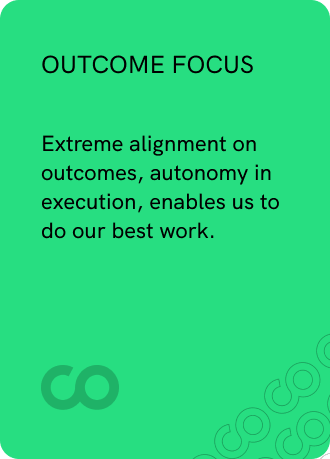
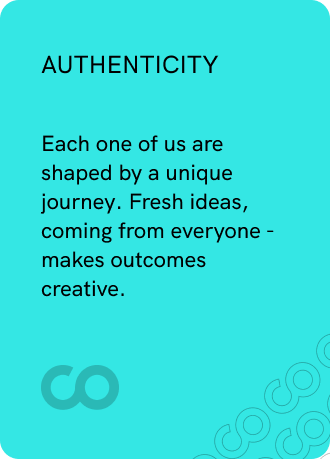
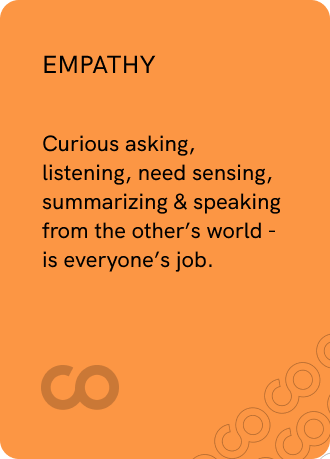
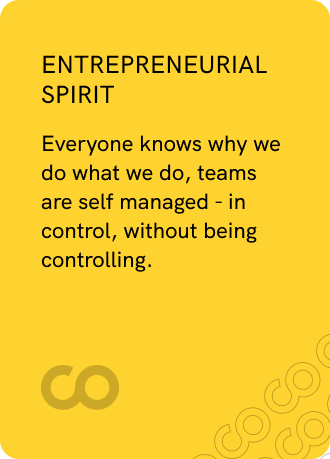
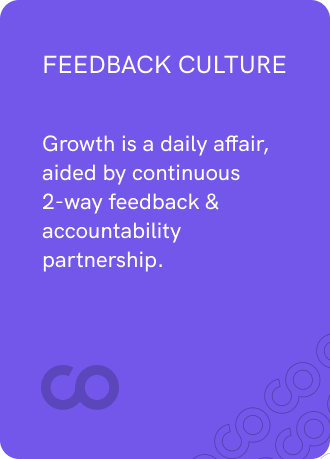
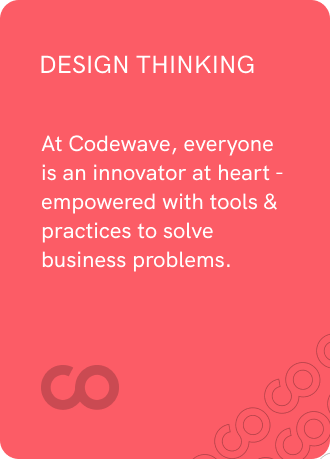
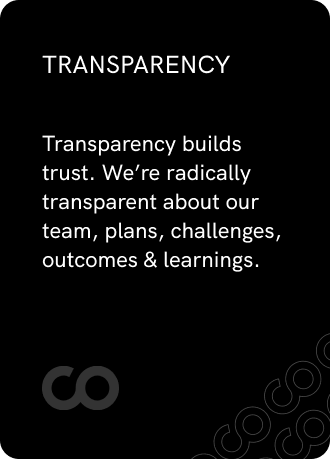
We transform companies!
Codewave is an award-winning company that transforms businesses by generating ideas, building products, and accelerating growth.
Frequently asked questions
These services help startups build digital products from scratch. They include frontend, backend, and cloud integration to launch user-focused platforms, test ideas quickly, and support product-market fit.
Startups use custom software to solve specific problems without extra features. It helps them stay lean, reduce tech debt, and launch fast with only the functions that matter to their users.
An MVP usually takes 6 to 10 weeks. The timeline depends on the feature set, design complexity, and how quickly feedback loops happen between the product team and users.
An MVP delivers only core features to test a concept. A full product builds on that foundation by adding scalability, integrations, security layers, and advanced functions needed for long-term growth.
Startups often choose React, Node.js, Flutter, and Python. These frameworks support quick iterations, handle user load well, and make it easier to build responsive web or mobile applications.
We begin by understanding your business needs. Then we build clickable prototypes, launch iterations fast, and align development cycles to user behavior, making sure the product solves a real problem.
We combine UX thinking with agile sprints. Every design decision supports business value. Our team works closely with you to build usable, modular products that are ready for scale from day one.
Yes. We maintain code, fix bugs, release new features, and track performance. Our focus stays on keeping the product stable, updated, and ready for any shifts in user behavior or goals.
Yes. We build lean MVPs, track how users interact with key features, and guide your team on what to build next using real engagement metrics—not assumptions.
We’ve developed startup products in fintech, retail, healthtech, and logistics. Projects include digital lending platforms, real-time delivery tracking apps, and healthcare dashboards that integrate with patient data systems.
We use modular architectures, containerized deployments, and cloud-native tools. This setup allows you to handle traffic spikes, add new modules fast, and avoid performance bottlenecks during scale-up.
Yes. You get a core team—designers, engineers, testers, and a product owner—who stay involved across all sprints, keeping the vision and build consistent throughout the project lifecycle.































































